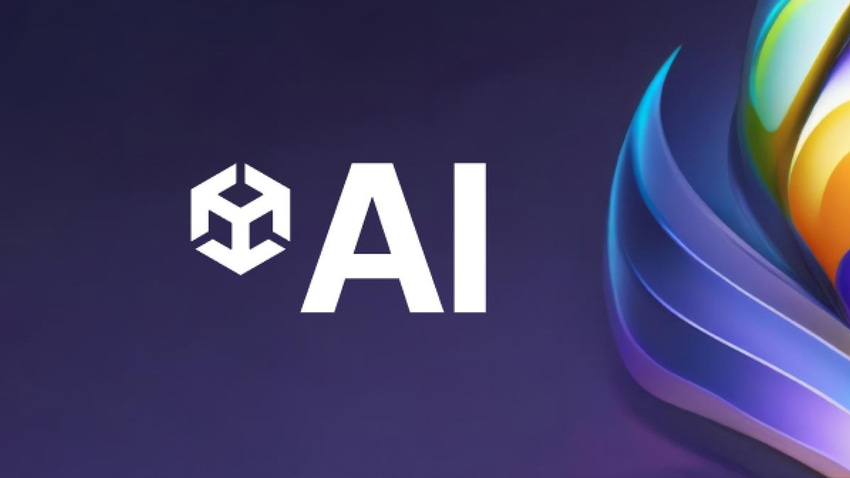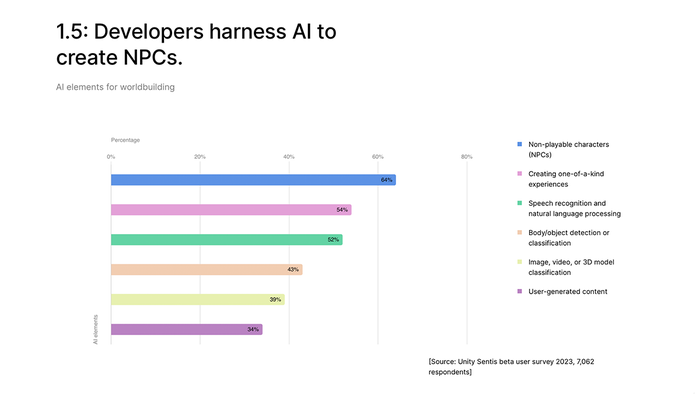2024 Unity Gaming Report indicates 62 percent of devs are currently using AI tools
And the majority of those developers have started incorporating generative AI tech into their workflows.

The 2024 Unity Gaming Report found that around 62 percent of developers are leveraging AI tools during production, and a good chunk of those developers appear to be leaning on generative AI tech.
The engine maker launched the report during GDC 2024 to highlight how developers are adjusting their workflows and practices amid "shifting market forces."
"While 2023 was a year marked with persisting economic headwinds, game developers are strategically navigating the challenges and successfully adapting to changes in technology, the economy, and player habits by doing more with less," said the company, which has contributed to those "headwinds" by laying off a huge number of workers in 2024.
"Even with tightened budgets, studios are still experimenting, investing and taking calculated risks to maximize efficiencies and resources. They are focused on key opportunity areas including: boosting productivity with AI tools, maximizing revenue with diverse ad strategies, and doubling down on multiplayer and multiplatform games to reach as many players as possible and keep them playing longer."
As noted above, the report itself found that just under two-thirds of surveyed developers have incorporated AI tools into their process, but how many of those developers are using generative AI?
According to data from the Unity Sentis beta user survey, which comprised 7,062 respondents, 63 percent of those developers who adopted AI tools confirmed they used generative tech for asset creation.
Overall, 71 percent of those developers using AI (both generative and other tools) claimed the tech has improved their delivery and operations. Niantic VP of product management, Kjell Bronder, told Unity that AI tools have the ability to "empower our designers."
"To increase our productivity, like many others, we’ve been really looking at AI and seeing how we can use this new generation of tools to empower our designers so they can create new assets to explore new ideas," said Bronder. "Also, how we can prototype new ways of characters, bring them to life, and have them animate in new ways."

Unity itself believes that AI usage across the game industry will "deepen and become normalized," and when spotlighting five trends that could "shape 2024 and beyond" suggested generative AI will "help make game development achievable."
"We expect that it will lower the threshold for implementing user-generated content, and AI will bring innovation to story-driven gameplay," added the company.
Unity and Muse
Unity is attempting to put AI tools into the hands of developers through its Muse platform, which utilizes Azure AI and OpenAI technology in some instances. The company also custom-built its own AI model using proprietary images and data to help developers produce sprites and textures.
Muse is billed as a toolkit that will help "streamline" production by giving developers access to information while enabling them to rapidly generate textures, animations, behaviors and more by using prompts. Yet, for all of the optimism expressed in Unity's report, the rise of generative AI tools has set off alarm bells in some corners of the industry.
Some developers have expressed concern that the integration of generative AI technology in particular will lead to further job cuts. There are also legal issues surrounding who owns the outputs produced by AI tools trained on publicly available data, such as those created by OpenAI.
Unity chief product and technology officer Marc Whitten, however, feels that generative AI tools will still need human oversight to reach their full potential. "Our belief is that nobody produces final code or art in one shot. It'll still take a lot of iteration that requires human expertise and experience," he told Game Developer. "Many tools make it easier for creators to realize or express their intent and we expect these AI tools to do just that–keep artists and creators at the center and give them more tools that they can use to iterate, refine, and mix together in order to realize their vision."
Whitten also suggested that, in the face of economic turmoil, it's imperative developers are able to bring products to market without delay. "As a software company, the best way for us to help devs navigate these headwinds is to double down on giving them the best possible development tools that enable faster time-to-market for their games and long-term success," he added.
"Central to doing this work is feedback from our community. Our creators tell us where we are helping them and they tell us when there is more work to do. This informs where we put our focus which includes: tools for them to build their games, deploy them to as many platforms/players as possible, build and scale multiplayer experiences and solutions to find and grow their audience."
You can access the full 2024 Unity Gaming Report right here.
Read more about:
Generative AIAbout the Author(s)
You May Also Like









